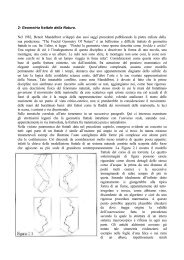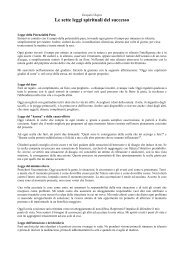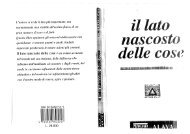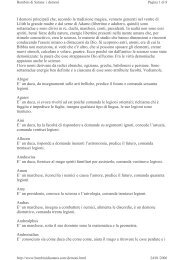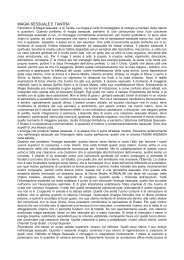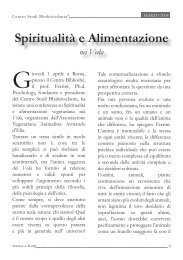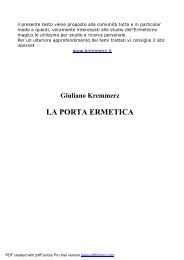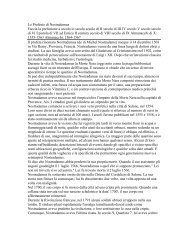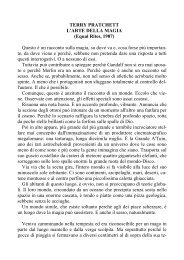108 ~ TALIBANa single one remained. Thus the Taliban's gender policies only worsenedan ongoing crisis. Within three months of the capture of Kabul, the Talibanclosed 63 schools in the city affecting 103,000 girls, 148,000 boys and11,200 teachers, of whom 7,800 were women. 5 They shut down Kabul<strong>University</strong> sending home some 10,000 students of which 4,000 werewomen. By December 1998, UNICEF reported that the country's educationalsystem was in a state of total collapse with nine in ten girls andtwo in three boys not enrolled in school. 6The Afghan people's desperate plight was largely ignored by the outsideworld. Whereas in the 1980s the war in Afghanistan attracted attentionand aid, the moment the Soviets withdrew their troops in 1989, Afghanistandropped off the radar screen of world attention. The ever dwindlingaid from wealthy donor countries, which did not even meet the minimumbudgetary requirements of the humanitarian aid effort, became a scandal.In 1996 the UN had requested US$124 million for its annual humanitarianaid programme to Afghanistan, but by the end of the year, it hadonly received US$65 million. In 1997 it asked for US$133 million andreceived only US$56 million or 42 per cent and the following year it Iasked for US$157 million but received only US$53 million or 34 percent. By 1999 the UN had drastically scaled down its request to justUS$113 million. In the words of scholar Barnett Rubin: 'If the situationin Afghanistan is ugly today, it is not because the people of Afghanistanare ugly. Afghanistan is not only the mirror of the Afghans: it is themirror of the world. "If you do not like the image in the mirror do notbreak the mirror, break your face," says an old Persian proverb.' 7When Kabul's women looked at themselves in the mirror, evenbefore the Taliban captured the city, they saw only despair. In 1996I met Bibi Zohra in a tiny bakery in Kabul. She was a widow wholed a group of young women who prepared nan, the unleavened bakedbread every Afghan eats, for widows, orphans and disabled people.Some 400,000 people in Kabul depended on these bakeries funded bythe WFP, which included 25,000 familes headed by war widows and7,000 families headed by disabled men. Zohra's mud shack was pockmarkedwith shrapnel and bullet holes. It had first been destroyed byrockets fired by Gulbuddin Hikmetyar's forces in 1993, then shelled bythe Taliban in 1995.With six children and her parents to support she had donated part ofthe tiny plot of land where her house once stood to WFP for a bakery.'Look at my face, don't you see the tragedy of our lives and our countrymarked all over it?' she said. 'Day by day the situation is worsening. Wehave become beggars dependent on the UN to survive. It is not theAfghan way. Women are exhausted, depressed and devastated. We arejust waiting for peace, praying for peace every minute of the day.'A VANISHED GENDER 109The plight of Bibi Zohra's children and other kids was even worse. Ata playground set up by Save the Children in the battered, half-destroyedMicroyan housing complex, rake-thin Afghan children played grimly onthe newly installed swings. It was a playground littered with reminders ofthe war - discarded artillery shell cases, a destroyed tank with a gapinghole where the turret once was and trees lopped down by rocket fire.'Women and children face the brunt of the conflict,' Save the Children'sDirector Sofie Elieussen told me. 'Women have to cope with no food andmalnutrition for their children. Women suffer from hysteria, trauma anddepression because they don't know when the next rocket attack willcome. How can children relate to a mother's discipline or affection whenthey have seen adults killing each other and mothers are unable to providefor their basic needs? There is so much stress that the children don'teven trust each other and parents have stopped communicating with theirkids or even trying to explain what is going on,' said Elieussen.A UNICEF survey of Kabul's children conducted by Dr Leila Guptafound that most children had witnessed extreme violence and did notexpect to survive. Two-thirds of the children interviewed had seen somebodykilled by a rocket and scattered corpses or body parts. More than 70per cent had lost a family member and no longer trusted adults. 'They allsuffer from flashbacks, nightmares and loneliness. Many said they felt theirlife was not worth living anymore,' said Dr Gupta. Every norm of familylife had been destroyed in the war. When children cease to trust theirparents or parents cannot provide security, children have no anchor inthe real world.Children were caught up in the war on a greater scale than in anyother civil conflict in the world. All the warlords had used boy soldiers,some as young as 12 years old, and many were orphans with no hope ofhaving a family, an education or a job except soldiering. The Talibanwith their linkages to the Pakistani madrassas encouraged thousands ofchildren to enlist and fight. Entire units were made up of kids as loadersfor artillery batteries, ammunition carriers, guarding installations and asfighters. Significantly a n\ajor international effort in 1998 to limit the ageof soldiers to 18, rather than the current minimum age of 15 met withresistance by the US, Pakistan, Iran and Afghanistan. A 1999 AmnestyInternational report said there were over 300,000 children under 18enlisted as soldiers worldwide. 8 The plight of women and children wouldget much worse after the Taliban capture of Kabul.Every Kabuli woman I met during 1995-96 - and reporters could theneasily meet and talk to women on the street, in shops and offices — knewtheir precarious lives would only get worse if the Taliban captured Kabul.One such woman was Nasiba Gul, a striking 27-year-old single womanwho aspired to be part of the modem world. A 1990 graduate of Kabul
TALIBAN<strong>University</strong>, she held down a good job with an NGO. Dressed in a longskirt and high heels, she rarely bothered to cover her face, throwing justa small scarf over her head when she travelled across the city. 'The Tali-1ban just want to trample women into the dust. No woman, not even thepoorest or most conservative wants the Taliban to rule Afghanistan,' saidNasiba. 'Islam says women are equal to men and respect should be given Ito women. But the Taliban's actions are turning people against evenIslam,' she added. Nasiba's fears were justified, for when the Taliban capturedKabul, women disappeared from public view. Nasiba was forced to •]stop working and left for Pakistan.The Taliban leaders were all from the poorest, most conservative andleast literate southern Pashtun provinces of Afghanistan. In MullahOmar's village women had always gone around fully veiled and no girlhad ever gone to school because there were none. Omar and his colleaguestransposed their own milieu, their own experience, or lack of it, withwomen, to the entire country and justified their policies through theKoran. For a time, some aid agencies claimed that this was the Afghancultural tradition which had to be respected. But in a country so diversein its ethnicity and levels of development, there was no universal standardof tradition or culture for women's role in society. Nor had any Afghanruler before the Taliban ever insisted on such dress codes as compulsorybeards for men and the burkha.The rest of Afghanistan was not even remotely like the south. AfghanPashtuns in the east, heavily influenced by Pakistani Pashtuns, were proudto send their girls to school and many continued to do so under theTaliban, by running village schools or sending their families to Pakistan.Here aid agencies such as the Swedish Committee supported some 600primary schools with 150,000 students of whom 30,000 were girls. WhenPashtun tribal elders demanded education for girls, Taliban governors didnot and could not object. 9 In Afghan refugee camps in Pakistan tens ofthousands of Pashtun girls studied. Outside the Pashtun belt, all otherethnic groups vigorously encouraged female education. Afghanistan'sstrength was its ethnic diversity and women had as many roles as therewere tribes and nationalities.Afghanistan's cities were even more diverse. Kandahar was always aconservative city but Herat's female elite once spoke French as a secondlanguage and copied the fashions of the Shah's court in Tehran. Forty percent of Kabul's women worked, both under the communist regime andthe post-1992 Mujaheddin government. Women with even a smatteringof education and a job exchanged their traditional clothes for skirts, highheels and make-up. They went to the movies, played sports and dancedand sang at weddings. Common sense alone should have dictated that to;win hearts and minds, the Taliban would have to relax their gender policy •,A VANISHED GENDER 111according to the prevalent realities in the areas they took control of.Instead they viewed Kabul as a den of iniquity, a Sodom and Gomorrahwhere women had to be beaten into conforming with Taliban standardsof behaviour. And they viewed the northerners as impure Muslims whohad to be forcibly re-Islamicized.The Taliban's uncompromising attitude was also shaped by their owninternal political dynamic and the nature of their recruiting base. Theirrecruits - the orphans, the rootless, the lumpen proleteriat from the warand the refugee camps - had been bought up in a totally male society. Inthe madrassa milieu, control over women and their virtual exclusion wasa powerful symbol of manhood and a reaffirmation of the students' commitmentto jihad. Denying a role for women gave the Taliban a kind offalse legitimacy amongst these elements. 'This conflict against women isrooted in the political beliefs and ideologies, not in Islam or the culturalnorms. The Taliban are a new generation of Muslim males who are productsof a war culture, who have spent much of their adult lives in completesegregation from their own communities. In Afghan society, women havetraditionally been used as instruments to regulate social behaviour, and assuch are powerful symbols in Afghan culture,' said Simi Wali, the headof an Afghan NGO. 10Taliban leaders repeatedly told me that if they gave women greaterfreedom or a chance to go to school, they would lose the support oftheir rank and file, who would be disillusioned by a leadership that hadcompromised principles under pressure. They also claimed their recruitswould be weakened and subverted by the possibility of sexual opportunitiesand thus not fight with the same zeal. So the oppression of womenbecame a benchmark for the Taliban's Islamic radicalism, their aim to'cleanse' society and to keep the morale of their troops high. The genderissue became the main platform of the Taliban's resistance to UN andWestern governments' attempts to make them compromise and moderatetheir policies. Compromise with the West would signal a defeat that theywere wrong all along, defiance would signal victory.Hardline Taliban turned the argument of the outside world on its head.They insisted that it was up to the West to moderate their position andaccommodate the Taliban, rather than that the Taliban recognize universalhuman rights. 'Let us state what sort of education the UN wants. Thisis a big infidel policy which gives such obscene freedom to women whichwould lead to adultery and herald the destruction of Islam. In any Islamiccountry where adultery becomes common, that country is destroyed andenters the domination of the infidels because their men become likewomen and women cannot defend themselves. Anybody who talks to usshould do so within Islam's framework. The Holy Koran cannot adjustitlf to other people's requirements, people should adjust themselves to
- Page 1 and 2:
YALE NOTA BENE"The broader storyher
- Page 3 and 4:
TalibanMilitant Islam,Oil and Funda
- Page 5 and 6:
Vi ~ CONTENTSChapter 8A Vanished Ge
- Page 7 and 8:
AFGHANISTAN•^ UZBEKISTAN J TAJIKI
- Page 9 and 10:
2 ~ TALIBANaccounts for some 40 per
- Page 11 and 12: "6 ~ TALIBANgas riches of landlocke
- Page 13 and 14: 10 ~ TALIBANgious mix that was to m
- Page 15 and 16: Part 1History of theTaliban Movemen
- Page 17 and 18: 18 ~ ISLAM OIL AND THE NEW GREAT GA
- Page 19 and 20: 22 ~ ISLAM OIL AND THE NEW GREAT GA
- Page 21 and 22: 26 ~ ISLAM OIL AND THE NEW GREAT GA
- Page 23 and 24: 30 ~ ISLAM OIL AND THE NEW GREAT GA
- Page 25 and 26: 34 TALIBANKabul- Hikmetyar had alli
- Page 27 and 28: 38 ~ TALIBANrHERAT 1995: GOD'S INVI
- Page 29 and 30: 42 ~ TALIBANdo manage to take Kabul
- Page 31 and 32: J46 ~ TALIBANgreater weight to UN e
- Page 33 and 34: 50 ~ TALIBANas they hung from steel
- Page 35 and 36: 54 ~ TALIBANthey would help rearm t
- Page 37 and 38: 58 TALIBANGul Mohammed Pahlawan, Gh
- Page 39 and 40: 62 TALIBAN2,500 Taliban, who had re
- Page 41 and 42: 66 TALIBANshould throw all aid agen
- Page 43 and 44: 70 ~ TALIBANyears of battle and hel
- Page 45 and 46: 74 ~ TALIBANThousands of Hazaras we
- Page 47 and 48: 78 TALIBANhas become a plague,' sai
- Page 49 and 50: NEW STYLE FUNDAMENTALISM OF THE TAL
- Page 51 and 52: 86 TALIBANsity students - Hikmetyar
- Page 53 and 54: 90 TALIBANSharia was heavily influe
- Page 55 and 56: 94 TALIBANinflamed the debate in th
- Page 57 and 58: 98 TALIBANizing factor of Islam, it
- Page 59 and 60: 102 TALIBANadministrations made the
- Page 61: 106 ~ TAUBANfrom working, but it no
- Page 65 and 66: 114 TALIBAN A VANISHED GENDER 115Ta
- Page 67 and 68: 118 TALIBANUS$1,300 - a small fortu
- Page 69 and 70: 122 TALIBANper cent of the total Pa
- Page 71 and 72: 126 TALIBANequipment, no electricit
- Page 73 and 74: 130 ~ TALIBANfight with the Mujahed
- Page 75 and 76: 134TALIBANAugust 1996 noted that Bi
- Page 77 and 78: 138 ~ TALIBANwho were using the Kho
- Page 79 and 80: 11DICTATORS AND OILBARONS: THE TALI
- Page 81 and 82: 146 TALIBAN DICTATORS AND OIL BARON
- Page 83 and 84: 150 — TALIBANgrowth of beards and
- Page 85 and 86: 154TALIBAN1998 when international o
- Page 87 and 88: 158 ~ TALIBANaround Afghanistan? Af
- Page 89 and 90: 162 TALIBAN ROMANCING THE TALIBAN 1
- Page 91 and 92: 166 TALIBAN ROMANCING THE TALIBAN 1
- Page 93 and 94: ROMANCING THE TALIBAN 2: 1997-99 17
- Page 95 and 96: 174 — TALIBANnon-Russian pipeline
- Page 97 and 98: 178 — TALIBANROMANCING THE TALIBA
- Page 99 and 100: 182 ~ TALIBANApril 1999. 'The US ha
- Page 101 and 102: 186 ~ TALIBANters or the transport
- Page 103 and 104: 190 ~ TALIBANThis Wild West of free
- Page 105 and 106: 194 ~ TALIBANgovernance. Pakistani
- Page 107 and 108: 198 TALIBAN SHIA VERSUS SUNNI: IRAN
- Page 109 and 110: 202 TALIBAN SHIA VERSUS SUNNI: IRAN
- Page 111 and 112: 206 — TALIBANin Afghanistan - to
- Page 113 and 114:
210 — TALIBANand antagonism. The
- Page 115 and 116:
214 ~ TALIBANdrawn since 1996 - a P
- Page 117 and 118:
218 ~ TALIBANated and severely puni
- Page 119 and 120:
Origins of Members of the Taliban M
- Page 121 and 122:
APPENDIX 3 ~ 227Appendix 3A CHRONOL
- Page 123 and 124:
230 ~ TALIBANgraves near Shebarghan
- Page 125 and 126:
234 ~ TALIBAN8 June. US FBI places
- Page 127 and 128:
238 ~ TALIBAN1995 January16 MarchAp
- Page 129 and 130:
242 ~ TALIBANJune21 August10 Septem
- Page 131 and 132:
246 ~ TALIBANDupree, Nancy Hatch, A
- Page 133 and 134:
250 ~ NOTESChapter 31 Interview wit
- Page 135 and 136:
254 ~ NOTESmuddin, Religious Police
- Page 137 and 138:
258 NOTES13. The Japanese company M
- Page 139 and 140:
262 ~ NOTES28. Waxman, Sharon, 'A c
- Page 141 and 142:
Abbas, Mulla Mohammed 22,61,100Abda
- Page 143 and 144:
INDEX - 270Hazaras (continued)burea
- Page 145 and 146:
INDEX ~ 274nF»r\/FaliViar» milita
- Page 147:
INDEX ~ 278Talibans (continued)Sunn




